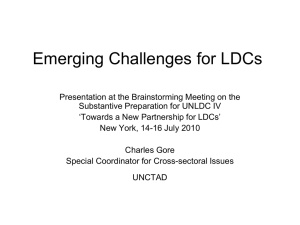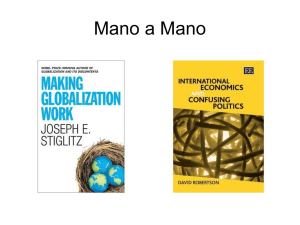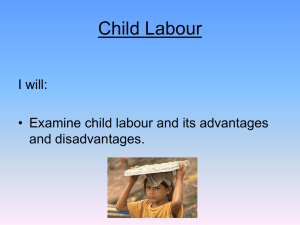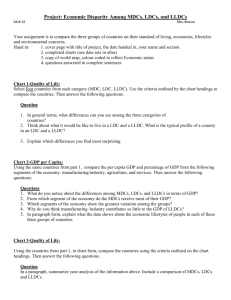workers in Guangdong(LDC)
advertisement
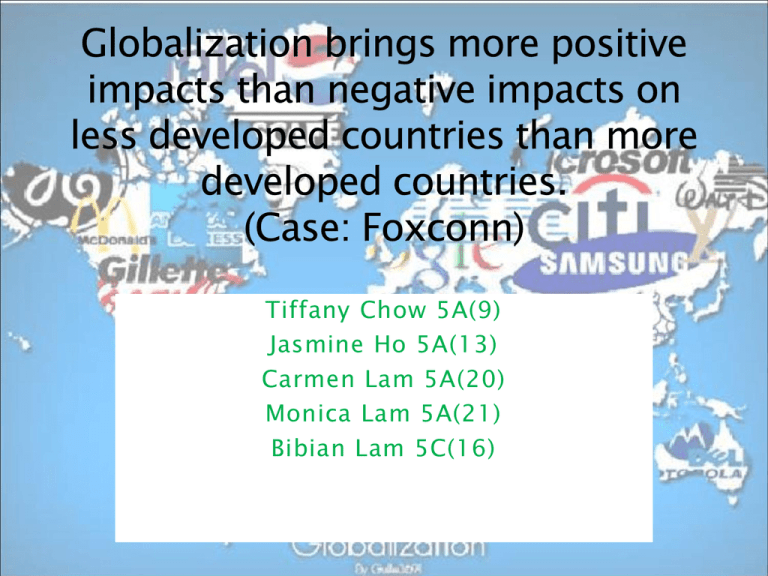
Tiffany Chow 5A(9) Jasmine Ho 5A(13) Carmen Lam 5A(20) Monica Lam 5A(21) Bibian Lam 5C(16) To less developed countries(LDC), globalization brings more positive impacts then negative impacts. To more developed countries (MDC), globalization brings more negative impacts than positive impacts. As economic men, they have to minimize the cost and maximize profit. Foxconn is a Taiwanese company, which is a MDC Sets up factories in China, which is a LDC (As cheap labor and low land rent cheap production cost) Imports raw materials from China, India, which are LDCs (because of low prices) final products to USA, the European countries, Asian countries and etc, which are MDCs (because of their higher living standard able to purchase different kind of goods) PULL FACTORS • World factory is the place to produce the raw materials in mass production for the world market • Example :Foxconn In LDC(China), there are pull factors to attract industrialist to invest -Cheap & skilled labour(because of good institution in big cities) high productivity for mass production -Supportive government-less restriction on doing business, have tax exemption -Cheap & large land (because the lands are from farming) lower production cost & easy to have expansion -Large market( because China has a large population) earn more profits For example, along in Pearl River Delta, there are many factories In MDC(Taiwan), there are push factors to repel industrialist to invest -Expensive labour(because of great demand of labour) high labour cost and production -Restrictive government more restriction on doing business like environmental tax -Expensive and small land(because of competition of land) higher production cost -Saturated market (because of long time of development)less customers earn less profits A) workers in Taiwan(MDC) Negative impact Economically, -flow of labour to China loss of jobs -lower job opportunities manufacturing workers are more easier to be unemployed Socially, -the unemployed workers have a lower living standard, for example , they have to face financial pressure and cut their expenditure B)workers in Guangdong(LDC) Positive impact -Jobs to local peoplealleviate the situation of unemployment -International flow of labourtransfer of the technology & skills from MDCs workers in Guangdong can learn from Taiwan and increase their competitiveness B)workers in Guangdong(LDC) Negative effects -Workers have jobs with dull working processmanagerial problems -They have to produce a large number of products because of mass production receive exploitation,like long working hours and low wages -Industrial restructuring unskilled workers are being laid-off 富士康聘實習生做奴工 太陽報2010-10-09 台資富士康大陸廠房早前多名員工墮樓,外界質疑員工的工作壓力過 大。兩岸三地二十所大專院校近日聯合發布《富士康調研總報告》, 披露富士康強制、超時加班、濫用學生勞工、漠視職業安全隱患等黑 幕。大部分廠房聘用學生勞工高達五成,由於僱用學生毋須簽署正式 合約,倘學生勞工受傷,面臨企業、學校、政府三不管困境,不獲合 理賠償。 北京大學、清華大學、香港理工大學、香港中文大學、台灣 大學等大專院校的師生,用問卷、訪談方式,更派出十四名調查團成 員應徵入廠放蛇,深入調查富士康位於深圳、南京、上海等九市的十 二個廠區。 加班超過規定逾倍 報告指出,富士康利用無需跟學生勞工簽正式合約、無需繳納社會保 險的法律漏洞,大量僱用實習生為廉價勞動力,強迫學生勞工超時加 班、強制未成年工人加夜班。學生主要來自於河南、安徽、四川的中 專院校。他們月平均加班八十三點二小時,違反《勞動合同法》每月 最多加班不超過三十六小時規定,甚至剋扣加班費。 富士康宣稱自六月起加薪三成,實際加薪幅度不足一成,加薪後取消 年資津貼和季度獎等福利,工作量明顯增加,加薪明升暗降。另外, 工廠以暴力手段管治工人,逾三成八工人曾被管理人員或保安限制自 由;逾一成六工人曾遭管理人員和保安體罰。 富士康跳樓女半癱 農父賣光牛羊求救 (明報)2010年9月19日 星期日 05:10 【明報專訊】「這是一個卑微農民的呼號,幫幫這個無法行走 的孩子!」富士康跳樓潮雖暫告平息,但賠償問題仍困擾家屬。 其中「第二跳」倖存少女現半身癱瘓,其農民父親奔走半年, 賣光家中牛羊,農田荒蕪,加上兒子聾啞,祖母老邁,走投無 路下昨發出求救信,指「富士康軍事化冷冰的氛圍,對員工高 壓、漠視」,希望集團對造成員工的傷害作相應補償。 富士康第二跳少女田玉年僅17歲,原與父親田建黨同住湖北省 老河口市孟樓鎮。田父說﹕「田玉是個懂事的女兒,會帶上弟 弟妹妹幫我幹農活、摘棉花,幫媽媽洗衣服、做家務。離開家 了,也會定時給家裏打電話。她喜歡養花,喜歡玉蘭花、茉莉 花。一想到她未來要在病床上度過,我心裏止不住地難受……」 「工作枯燥 上級苛刻 同事冷漠」 田玉去年中專畢業後,今年2月隨表姐到深圳打工,在富士康龍 華廠區工作。「她向我們說,龐大的廠區像個迷宮,第一天就 迷路了。一上生產線,就得整天高強度地工作,用肉眼檢查產 品上是否有刮痕;枯燥、不能很好的休息。上級非常嚴厲苛刻, 未犯錯已被線長粗暴地冤枉責罵。同寢室的8個姑娘來自8個不 同的事業群(部門),完全沒交流,感情十分冷漠。這是一個 毫無人情味的冰窖。」 田父認為富士康的無理壓力逼女兒走向自毁,「出事那天,是 每月發薪的時間,田玉工作一月有餘,卻沒有領到工資。她在 幾個部門跑來跑去,問了又問,卻沒人告訴她要去哪裏領工資 卡。這時她身上只剩下幾十塊錢,手機也壞了,無法與外界聯 繫。回了寢室,面對的卻是那些陌生冷漠的面孔。」今年3月 17日,田玉從龍華園區宿舍4樓跳下,幸送院搶救保住性命。 田父從醫生得知,女兒脊椎神經受創,腹部以下完全沒知覺, 「這輩子,她已感覺不到雙腿的存在,不能自理大小便,無法 出去打工、獨自出門了」。田父說,女兒左手亦骨折畸變,要 繼續接受手術。「治療及生活費用是難以承擔的天文數字。」 家貧缺勞動者 促集團賠償 田父慨嘆,自己背負一個悲劇之家,妻子頂著嚴重胃病在醫院 照顧女兒,「田玉的妹妹剛上初二,12歲的弟弟是個聾啞人, 還有一個80多歲的奶奶……我將家裏所有牛羊全部賣掉了,再 向人借了1000元就趕來深圳」。他說,家裏已沒有勞動力,以 後只剩自己苦耕10餘畝粟米,一年收成三四千元。 廠方已賠27萬醫療費 「富士康軍事化的管理方式、冷冰的企業氛圍、對員工的高壓 與漠視,跟田玉跳樓有很重要的關係,儘管我認為跳樓是錯誤 的。」田父希望富士康檢討自身管理,賠償田玉日後的醫療費 和生活費等,「富士康至今已經支付27萬醫療費,我卻想給女 兒找更好的醫院」。但他與富士康的談判一直未有最終結果, 「隨著事情被社會淡忘,我家的田地也荒蕪了,這樣下去,只 好把女兒接回去,繼續種田吧。做父親的,多累都值得」。 D) Taiwan government (MDC) Negative impact entrepreneur should fulfill the responsibilities of a Taiwanese, i.e. contributing to his own country, Investing in china is a bit unfair to Taiwan Deindustrialization to LDC: - Less jobs - New investment shrinks - Local economy declines - Vicious cycle of economic recession & urban decay E) Environmentalists in Guangdong (LDC) Negative impact Oppose globalization & multi-point production because of environmental problems Although Foxconn is research and development intensive, it does not emit much pollutants - - But, the factory has to use water for cooling the machines thermal pollution adversely affects the ecosystem of river F) Human rights protectors in Guangdong(LDC) Negative impact Exploitation of workers is common (as insufficient labour right system to protect workers) • The workers have to work for a long time each day to reach the demand set by Foxconn overworked under pressure and being exploited having mental illness Yes China is ‘factory of the world’ many companies still rely on factories in China to produce electronic components Large population in China large pool of labour Low land rent and wages in China lower production cost obtain more profit Exploitation of workers Implement laws of minimum wage, maximum working hours of the workers e.g. unemployment in Taiwan Taiwan government can… diversify economy hold retraining programmes for workers provide CSSA seek for investments Pollution Monitor air quality by setting up laws There are more negative impacts than positive impacts brought by globalization to less developed countries There are also more negative impacts than positive impacts brought by globalization to more developed countries. Hence, we partly agree with the statement.


